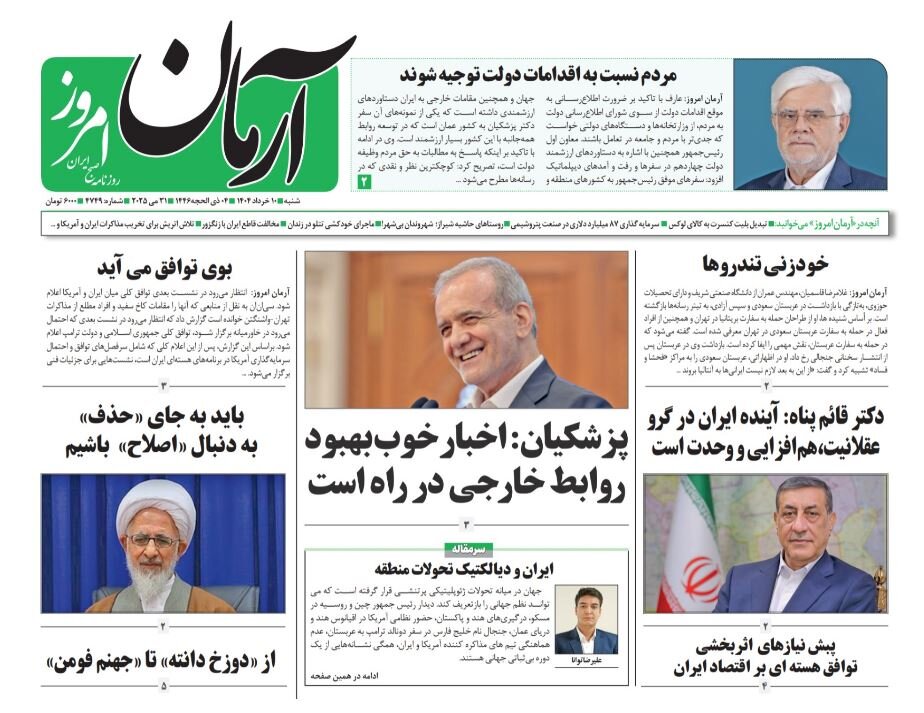Role of the economy in reinforcing Iran-Oman ties

TEHRAN - In a note, Arman-e-Emrooz discussed the relations between Oman and Iran and wrote: The relations between Iran and Oman are not limited to the political and diplomatic arenas, but have also expanded to the economic field.
An implementation of the proposed projects, especially the gas pipeline project that extends from the southern coast of Iran to the port of Sohar in Oman, would solidify ties between the two coastal neighbors. This project presents a rare opportunity to transform the Kingdom of Oman into a regional hub for gas exports, leveraging its advanced infrastructure and strategic geographical location. Also, considering the export restrictions due to international sanctions on Iran, this plan provides Iran with a growing economic outlet and opens new horizons for the injection of Iranian gas into global markets. The Iranian gas pipeline to Oman will even provide the possibility of expanding the network to other regional destinations and India in the future. The importance of Oman as a trading partner for Iran is very significant, not only because of its access to the Persian Gulf and African markets but also because of the friendly business environment and the supportive policies of the Omani government.
Vatan-e-Emrooz: Emphasis on red lines
Iran's position was expressed openly as Foreign Minister Araghchi emphasized Iran's red lines at the beginning of the indirect talks between Iran and the United States: "The lifting of all sanctions and the recognition of Iran's right to nuclear enrichment", two key issues that Tehran has always pursued in negotiations, and until these two rights are realized, it is impossible to comment on the agreement or its timing. Therefore, in a situation where the American side has not yet revised its position on stopping enrichment in Iran, the discussion that an agreement is imminent is irrelevant. Accordingly, the Foreign Minister clarified that Iran is not yet sure that it is at the point of "an imminent agreement" with the Americans. It seems that the Americans' rush to announce the imminent agreement is a propaganda in line with psychological warfare, to affect public opinion in Iran. Accordingly, the approach being followed by Western media and American officials may suggest that America is seeking an agreement with Iran, although Iranian officials are in no hurry to reach this agreement. Given the experience of the JCPOA and the United States’ unilateral withdrawal from it, coupled with the non-commitment of other Western parties to it, this time Iran is pursuing negotiations without haste, and does not intend to be a victim of propaganda.
Javan: The need to use experiences in the past talks
In a commentary, Javan discussed the principles that should be taken seriously during the current negotiations and said: During the current negotiations, which are in their final moments, five key principles should be taken seriously based on the past experiences and current realities: avoiding politicization, independence of the economy from negotiations, adopting an active narration, rebuilding the image of Iran's authority, and synergy with domestic currents. The indirect talks between Iran and the United States in 2025 are in a different context than in 2013. Changes in the geography of power, including the decline of American influence, the emergence of new blocs, and the economic crises in Europe, along with internal changes in Iran, convergence in decision-making, and social maturity, have provided new opportunities for Iranian diplomacy. The success of negotiations does not lie in signing a formal agreement, but in following a comprehensive strategy to strengthen domestic power and leverage global opportunities. In this endeavor, preserving the three principles of “honor, wisdom, and expediency” as the core of Iran's revolutionary diplomacy is an undeniable necessity.
Shargh: The sixth round of Iran-U.S. negotiations?!
In an analysis, Shargh examined the pressure from Western media outlets on the eve of the sixth round of negotiations and stated: Although some Western media outlets are speculating and reporting vaguely about the proximity to an agreement or the existence of a framework known as the "Muscat Framework," Iranian and American officials have denied announcing the time and place of the sixth round of talks and emphasized that a final agreement has not yet been reached. Fundamental differences regarding the preservation of Iran's nuclear rights and the complete lifting of sanctions still persist, and any definitive decision on continuing the negotiations depends on actual progress at the negotiating table. In sum, it should be emphasized that given the official positions of the parties, the existence of the option of simultaneous threats and negotiations on the table, and the imposition of new U.S. sanctions against Iran, no definitive decision has yet been made regarding the time and place of the sixth round of negotiations, and all news published in this regard remains speculative. The negotiation process must continue in a diplomatic atmosphere and without media attention to enable a lasting agreement.
Leave a Comment